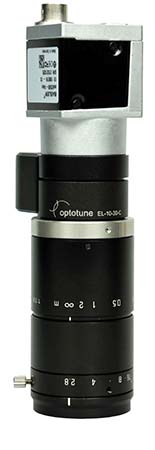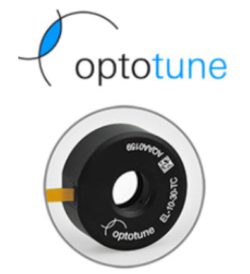
Optotune lenses solve a machine vision industry problem!

so
Machine Vision applications requiring the inspection of objects at various heights can become a challenge as normal lens have limited depth of field. Objects outside of the depth of field become out of focus, limiting the vision application. Historically, a lens with motorized focus adjustment would be implemented adding complexity, cost and long cycle times. In reality, this challenge is applicable to any imaging application requiring refocusing due to various lens working distances.
Optotune Focus tuneable lenses solves this problem eliminating motorized zoom lenses or manual intervention.
Click here NOW for full detail specifications on tunable lenses
Adding an Optotune tunable liquid lens to the optical system on a standard C-mount lens and camera, allows refocusing of the imaging system on the fly. When used in conjunction with distance sensors, its possible to inspect objects of various heights, refocusing within 15 milli-seconds.
For example, vision systems using 8mm to 50mm focal length lenses can be equipped with a tuneable lens in the front, typically mounted on the filter thread. In this configuration it is possible to focus from infinity down to about 100mm or less if spacers are added.
This solution can be applied to industrial machine vision applications, ophthalmology, laser, microscopy, postal, packaging and laser applications to name a few.
Contact 1stVision for a quote on Optotunes Tunable lenses
Advantages
A change in lens radius of several micrometers can have the same optical effect as moving the entire lens several centimeters. In turn there are several advantages
- Optical systems can be designed more compact, oftentimes with less lenses and usually with less or no translational movement.
- Large working distance ranges can be achieved
- Eliminate expensive mechanical actuators resulting in a more robust design, which can be completely closed so that no dust can enter. Essentially no moving parts for long life cycles (> 1B cycles)
- Weight and volume is reduced in the system.
- Low power consumption.
- Fast response time of systems, down to the order of milliseconds.
- Easy installation and remote focus control
- Advanced controls for very accurate and repeatable control of the lens using Gardasofts TR-CL180 controllers
Want to know more? Download Optotunes comprehensive white paper here
This white paper will review the overall principles of tunable lenses, response times, wavefront quality, drive methods, and applications.
